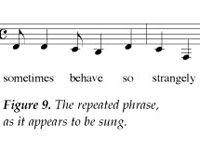HV132- Musicality of Speech

![]() Hearing Voices from NPR®
Hearing Voices from NPR®
132 Musicality of Speech: Spoken Melody
Host: Barrett Golding of Hearing Voices
Airs week of: 2012-02-15
This program contains copyrighted material not licensed for web-streaming, so we cannot offer an mp3 of this week’s episode.
A history of what composer Steve Reich calls speech-melodies:
“Come Out” (1966 / 3:00 excerpt) Steve Reich
“It’s Gonna Rain” was composed in San Francisco in January 1965. The voice belongs to a young black Pentecostal preacher who called himself Brother Walter. I recorded him along with the pigeons and traffic one Sunday afternoon in Union Square in downtown San Francisco. Later at home I started playing with tape loops of his voice and, by accident, discovered the process of letting two identical loops go gradually out of phase with each other.
In the first part of the piece the two loops are lined up in unison, gradually move completely out of phase with each other, and then slowly move back to unison. In the second part two much longer loops gradually begin to go out of phase with each other. This two-voice relationship is then doubled to four with two voices going out of phase with the other two. Finally the process moves to eight voices and the effect is a kind of controlled chaos, which may be appropriate to the subject matter – the end of the world.
“It’s Gonna Rain” is the first piece ever to use the process of gradually shifting phase relations between two or more identical repeating patterns. The second was “Come Out.” Composed in 1966, it was originally part of a benefit presented at Town Hall in New York City for the retrial, with lawyers of their own choosing, of the six boys arrested for murder during the Harlem riots of 1964. The voice is that of Daniel Hamm, now acquitted and then 19, describing a beating he took in Harlem’s 28th precinct station. The police were about to take the boys out to be “cleaned up” and were only taking those that were visibly bleeding. Since Hamm had no actual open bleeding he proceeded to squeeze open a bruise on his leg so that he would be taken to the hospital.
“I had to like open the bruise up and let some of the bruise blood come out to show them.” More…